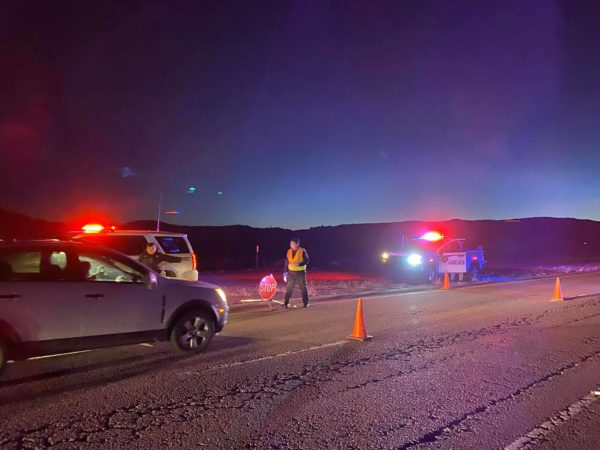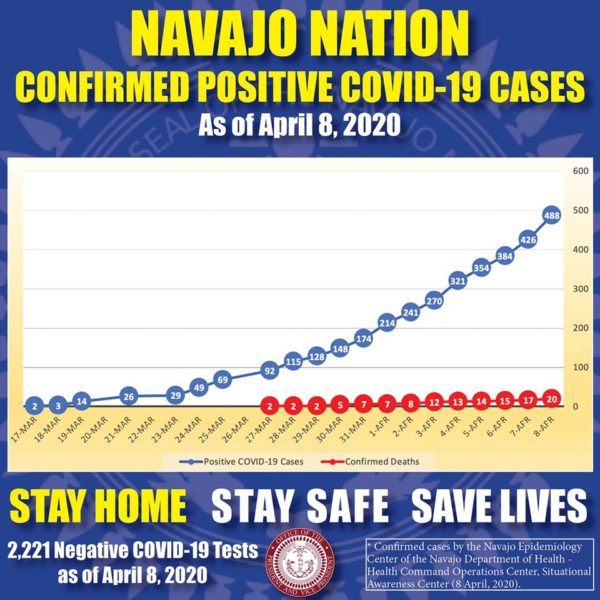
- Details
- By Levi Rickert
WINDOW ROCK, Ariz. — On Wednesday evening, the Navajo Nation released numbers that show a worsening trend of those who has tested positively for the COVID-19 (novel coronavirus). There was an increase of 62 cases since Tuesday, which brings the total number of cases to 488 and trendign fast towards 500.
Three more deaths were reported since Tuesday. The death toll from COVID-19 now stands at 20.
The 488 confirmed positive cases include the following counties:
- Navajo County, AZ: 186
- Apache County, AZ: 50
- Coconino County, AZ: 116
- McKinley County, NM: 45
- San Juan County, NM: 70
- Cibola County, NM: 9
- San Juan County, UT: 10
- Socorro County, NM: 2
"Per capita, our numbers are very alarming. The only way we’re going to beat COVID-19 is by practicing T’áá hwó’ ajít’éego, self-determination. The teachings of our Navajo elders still help and guide us to this day. Each and every one of us has to take it upon ourselves to self-isolate – when we isolate ourselves, we isolate the virus,” Navajo Nation President Jonathan Nez said.
“With the 57-hour weekend curfew coming up, we are hopeful that we’ll begin to see a steady decrease in the number of positive cases, but it will only work if we make it work by staying home as much as possible,” Nez continued.
The Nation’s latest Public Health Order implementing a 57-hour curfew will take effect on Friday at 8:00 p.m. until Monday at 5:00 a.m., except for essential employees who are required to have documentation from their employer. Navajo Police will strictly enforce the curfew order by issuing citations that may include a fine up to $1,000 and/or 30 days in jail.

On Thursday at 10:00 a.m. (MDT), the Navajo Nation and Navajo Area Indian Health Service will host another online Town Hall to provide the latest COVID-19 updates on the Nez-Lizer Facebook page, which will also be aired on KTNN 660AM and 101.5FM on Thursday at 6:00 p.m. (MDT).
For more information including reports, helpful prevention tips, and more resources, please visit the Navajo Department of Health’s COVID-19 website at http://www.ndoh.navajo-nsn.gov/COVID-19. To contact the main Navajo Health Command Operations Center, please call (928) 871-7014.
For up to date information on impact the coronavirus pandemic is having in the United States and around the world go to: https://www.worldometers.info/coronavirus/country/us/?fbclid=IwAR1vxfcHfMBnmTFm6hBICQcdbV5aRnMimeP3hVYHdlxJtFWdKF80VV8iHgE
For up-to-date information about COVID-19, Native News Online encourages you to go to Indian Health Service’s COVID-19 webpage and review CDC’s COVID-19 webpage.
How to help Native News Online: Send us news. Sign up for our daily enewsletter. Follow us on Facebook and Twitter. Share our articles. You can also donate to Native News Online here. Most importantly, take care of yourself. Megwetch.
More Stories Like This
Native News Weekly (August 25, 2024): D.C. BriefsUS Presidents in Their Own Words Concerning American Indians
Native News Weekly (December 14, 2025): D.C. Briefs
Wounded Knee Massacre Site Protection Bill Passes Congress
Two Murdered on Colville Indian Reservation
Help us defend tribal sovereignty.
At Native News Online, our mission is rooted in telling the stories that strengthen sovereignty and uplift Indigenous voices — not just at year’s end, but every single day.
Because of your generosity last year, we were able to keep our reporters on the ground in tribal communities, at national gatherings and in the halls of Congress — covering the issues that matter most to Indian Country: sovereignty, culture, education, health and economic opportunity.
That support sustained us through a tough year in 2025. Now, as we look to the year ahead, we need your help right now to ensure warrior journalism remains strong — reporting that defends tribal sovereignty, amplifies Native truth, and holds power accountable.
 The stakes couldn't be higher. Your support keeps Native voices heard, Native stories told and Native sovereignty defended.
The stakes couldn't be higher. Your support keeps Native voices heard, Native stories told and Native sovereignty defended.
Stand with Warrior Journalism today.
Levi Rickert (Potawatomi), Editor & Publisher

